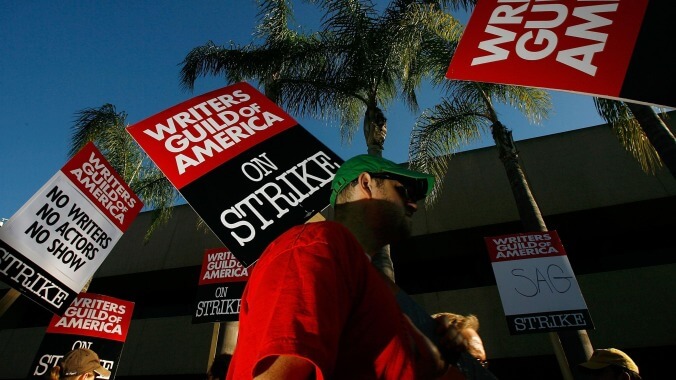Picketing during the 2007 WGA strike Photo: David McNew
Another Hollywood writers’ strike just got significantly more likely, with the Writers Guild Of America reporting that its members have overwhelmingly voted in support of a strike authorization. More than 97 percent of its members voted in favor of authorizing a strike, with a Variety report saying that nearly 80 percent of all eligible members had cast ballots. A statement from the WGA also notes that this sets a new record both for voter participation and support in a strike authorization vote, which should send a pretty definitive message to the Alliance Of Motion Picture And Television Producers ahead of the May 1 expiration date of the WGA’s current contract.
For comparison, the authorization vote for the 2007 writer’s strike, which ground Hollywood to a halt and lasted for over 100 days (during which no work could be conducted involving union writers), got a 90 percent approval.
For those new to union business: A strike authorization vote does not mean that a strike is happening right now, it means that the members have voted in favor of granting the union’s negotiators the ability to call a strike if they can’t reach an agreement. So, while it doesn’t mean that a strike will happen, it does mean that strike now can happen and that the relevant WGA members are serious enough about their demands that they’re willing to strike over them. This also doesn’t mean that a strike will automatically happen on May 1, just that it could.
As for what the writers are asking for, the headlining demand is what Variety describes as a “major reworking of writer compensation” that would overhaul the way streaming residuals work (they are currently very low, and with companies just launching their own platforms and commissioning their own content, they can argue against themselves to make them as low as possible) and introduce a minimum staffing requirement for TV shows (putting an end to the days of, say, one or two people writing every episode of a prestigious HBO series themselves and not hiring/paying any writers, not that we’re referring to anything specific).
Basically, a lot of things can’t get made without writers, and writers deserve to be fairly compensated because of that. Right now, they are not. Hopefully, through the power of collective bargaining, that will change.

 Keep scrolling for more great stories.
Keep scrolling for more great stories.
